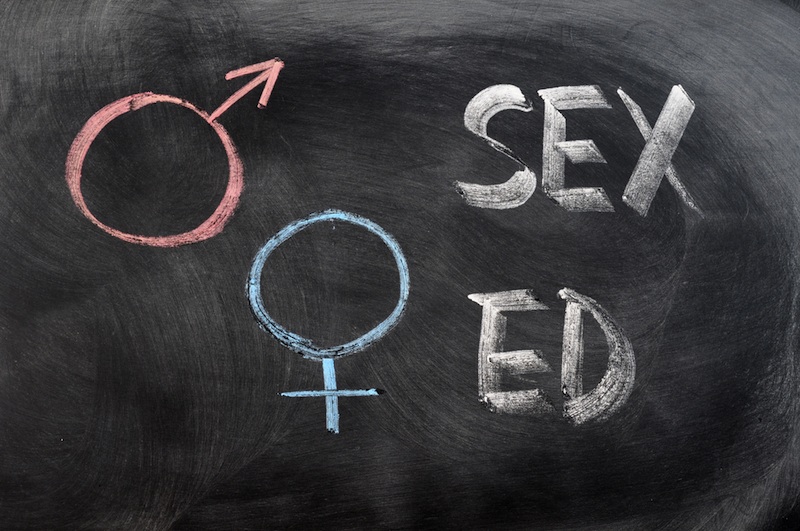Sex Education Delays Teen Sex, Study Finds

Teens who receive formal sex education wait longer to have sex, a new study finds — and when they do get around to doing the deed, they're more likely than teens who haven't had sex ed to use contraception.
The study couldn't fully tease out the differences between abstinence-only sex education and sex education that also includes discussion of birth control methods, but the researchers wrote that contrary to some critics' beliefs, there is no evidence that sex education encourages teens to have sex sooner or to take more sexual risks.
The study, conducted by researchers from the reproductive health research organization The Guttmacher Institute, used data from the 2006 to 2008 National Survey of Family Growth. In this survey, 4,691 participants, ages 15 to 24, told researchers whether they had ever had formal instruction in "how to say no to sex" and in "methods of birth control." The teens and young adults also answered questions about their first experience with vaginal sex.
Abstinence-only vs. comprehensive
The questions couldn't differentiate between comprehensive sex education — which includes instruction on both how to delay sex and the proper use of birth control — and abstinence-only education, which focuses only on delaying sex until marriage. That's because some abstinence-only programs do discuss birth control in order to emphasize the failure rate of various methods. The researchers couldn't be sure of the quality or content of instruction, so the resulting classifications of sex ed as "abstinence-only" or "with birth control instruction" are tentative. [Birth Control Quiz: Test Your Knowledge]
The results showed, however, that two-thirds of young women and 55 percent of young men received some sort of instruction on birth control and abstinence before their first sexual experience. About 20 percent said they only learned how to delay sex, while 16 percent of females and 24 percent of males got no sexual education at all.
The last group was the worst off when it came to risky sexual behaviors. Of the students who had any type of sex education, 77 percent of women and 78 percent of men had sex before they turned 20. For young adults with no sexual instruction, those numbers jumped to 86 percent and 88 percent, respectively.
Get the world’s most fascinating discoveries delivered straight to your inbox.
Using protection
In addition, students who had sex education were more likely to use contraception during their first sexual encounter compared with those who hadn't received sex ed. They also had "healthier partnerships," being less likely to lose their virginity to someone more than three years older or younger than themselves. [Teen Pregnancy: A Winnable Public Health Battle?]
The researchers found little difference on these contraception measures between the abstinence-only group and the group who received birth control instruction, although young women who had received birth control instruction were more likely to protect themselves by using condoms during their first intercourse. Other studies have found that comprehensive sex education is better at delaying vaginal sex and reducing teen pregnancy than abstinence-only education; however, a 2010 study published in the journal Archives of Pediatrics & Adolescent Medicine found that abstinence education can delay sex in young teens.
"It appears that talking with adolescents about sex — before they first have sex — seems to be what is important, regardless of the specific subject matter," the researchers wrote in the new study published online March 7 in the Journal of Adolescent Health.
The effectiveness of sexual education may depend, in part, on where the students are. A recent study published in the Archives of Pediatrics & Adolescent Medicine found that sex ed is less effective at reducing teen birthrates in more conservative areas, perhaps because instruction is not as high-quality. Attitudes toward abortion may play a role in teen birthrates, too, the study found, with teens in more conservative areas less willing or less able to get the procedure, making them more likely to carry to term.
The new Guttmacher study also turned up some alarming demographic differences in sex education, with minority students and students in lower-income families less likely to receive any sexual education at all. For example, one-third of minority men received no formal sex ed. Girls from lower-income families with less-educated parents were also less likely than their better-off counterparts to receive instruction on birth control.
"These demographic groups have poorer SRH [sexual and reproductive health] outcomes, including higher rates of STIs [sexually transmitted infections] and teen pregnancy, highlighting the unmet need for formal instruction in sex education," the researchers wrote.
You can follow LiveScience senior writer Stephanie Pappas on Twitter @sipappas. Follow LiveScience for the latest in science news and discoveries on Twitter @livescience and on Facebook.

Stephanie Pappas is a contributing writer for Live Science, covering topics ranging from geoscience to archaeology to the human brain and behavior. She was previously a senior writer for Live Science but is now a freelancer based in Denver, Colorado, and regularly contributes to Scientific American and The Monitor, the monthly magazine of the American Psychological Association. Stephanie received a bachelor's degree in psychology from the University of South Carolina and a graduate certificate in science communication from the University of California, Santa Cruz.


